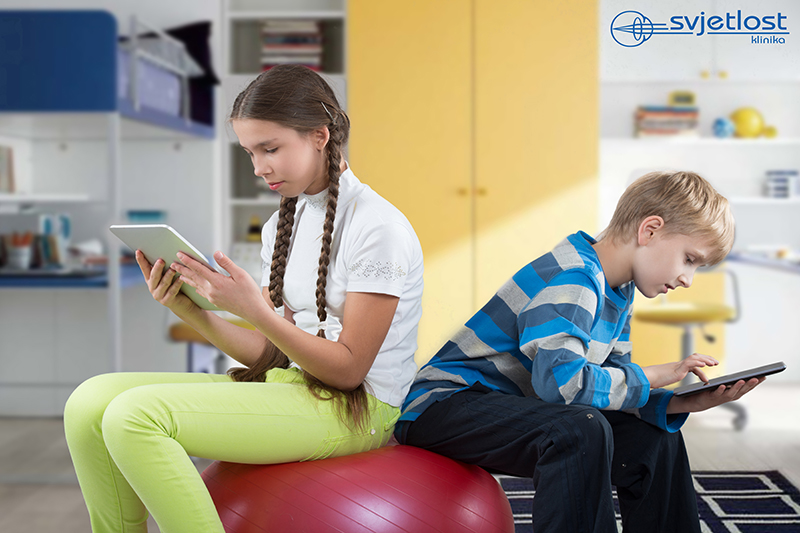Although the direct link between long-term work on the computer and increased dioptric growth still hasn’t been proven, the occurrence of short-sightedness in children (but also adults) is often associated with the increasing workload on the computer.
Nowadays the use of computers has become normal, we can find at least one computer in almost every home, and the percentage of children who have their own computer is growing. The number of hours spent in front of the computer over the past 10 years has risen by an average of more than 1h, and children in puberty and adolescents spend more than 90 minutes per day checking messages on mobile phones.
The number of short-sighted people has grown considerably in the last 30 years. An American study has shown a 66% increase in people older than 12 years. When we recall our childhood and compare it to today's children, we realize that we spent more time outdoors as children, parents would hardly have us home, while the situation is now that children spend a lot of time in front of a computer, tablet or cell phone and parents literally push them to play outside.
Although the direct link between long-term work on the computer and increased dioptric growth still hasn’t been proven, the occurrence of short-sightedness in children (but also adults) is often associated with the increasing workload on the computer. The eye must accommodate when watching near (sharpen the focus) which requires some effort. Due to constant effort to make the picture fall on the retina, the eye adjusts by extending and becomes short-sighted.
How to avoid your children having visual problems because of watching the monitor?
The number of short-sighted people has grown considerably in the last 30 years. An American study has shown a 66% increase in people older than 12 years. When we recall our childhood and compare it to today's children, we realize that we spent more time outdoors as children, parents would hardly have us home, while the situation is now that children spend a lot of time in front of a computer, tablet or cell phone and parents literally push them to play outside.
Although the direct link between long-term work on the computer and increased dioptric growth still hasn’t been proven, the occurrence of short-sightedness in children (but also adults) is often associated with the increasing workload on the computer. The eye must accommodate when watching near (sharpen the focus) which requires some effort. Due to constant effort to make the picture fall on the retina, the eye adjusts by extending and becomes short-sighted.
How to avoid your children having visual problems because of watching the monitor?
- Check your child’s vision. Children are adaptable, and they can assume that what they see and how they see is normal even though they may have vision problems. A child needs to make a detailed check the vision after the third year of life, and especially before the start of school.
- Limit the time spent on your computer. Children are not aware of how much time they spend in front of the screen, and sometimes they can watch the screen for hours with only a few pauses or without them. Explain to them that they are more likely to have a healthy break for their eyes and to try to rule 20-20 every 20 minutes to take a break of 20 seconds. This will reduce the effort of the accommodation.
- Improve the conditions in which you work on your computer. Children are smaller than adults for which computers are normally intended and their viewing angle may be different. Computer users should look at the screen downwards and the distance from the computer should be between 40-70 cm. Work closer than 40 cm causes an effort to be accommodated. Reduce the amount of light in the room when working on a computer. Windows and other light sources should not be directly visible when watching the monitor.
- Pay attention to frequent blinking or rubbing the eyes. When we focus on something, our brain blocks blinking so it doesn’t lose picture, and with less blinking it gets dryer. The dryness of the eye has become a modern age disease because of the excessive use of the computer, and unfortunately, the children are increasingly having this problem. Artificial tear dropping solves this problem, but staying in the fresh air without looking at the screen is far more healthy for the eyes and for the child.
Eye Clinic Svjetlost



